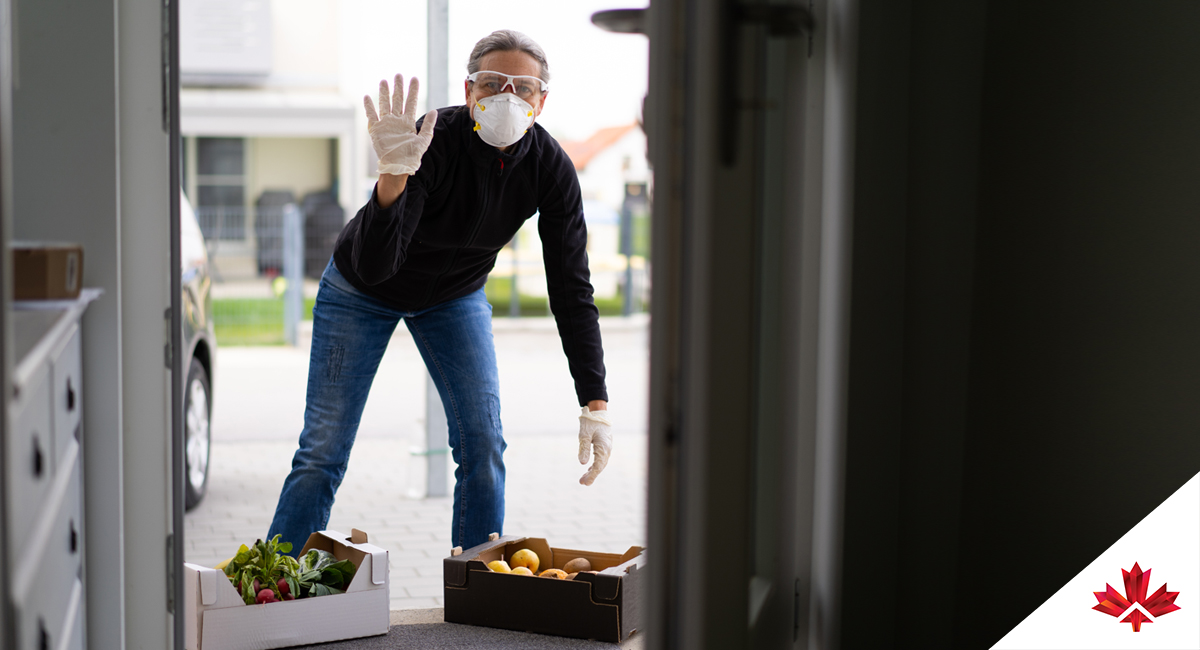Global pandemic: How Canada is rising to the challenge

On December 30, 2019, Toronto-based BlueDot informed its clients about unusual pneumonia cases detected around a market in Wuhan. Using artificial intelligence, the company’s platform predicts the spread of infectious diseases. It was the first to predict the COVID-19 outbreak.
Three months later, companies everywhere in Canada are finding new ways to join the fight and are spearheading a global movement of collaboration. While biotech companies search for a cure, manufacturers are repurposing their production lines to supply medical gear and tech companies are pitching in to support healthcare professionals, small businesses and Canadians.
Times may feel uncertain, but one thing is clear, Canada stands strong in resilience.
We’re still here to help. Contact us to work on your business expansion project.
Breaking new ground
If there was ever a time to see Canada’s talent in action, this is it. Across the country, our life sciences ecosystem is mobilizing to find innovative medical solutions to the ongoing global crisis – and it’s working.
In Halifax, Sona Nanotech is developing a COVID-19 antigen test capable of producing rapid, on-site results. With support from NGen, Canada’s advanced manufacturing supercluster, the company has designed a prototype and is now progressing through testing to ensure quality and accuracy. Over 3 million pre-orders for the test kit have been placed.
In Québec City, Medicago, a biopharmaceutical company specialized in plant-based technology, has developed a coronavirus vaccine candidate it plans to begin testing on humans in July. The support the company has received from both the federal and provincial governments will allow it to quickly proceed to clinical trials and scale up production. Other Canadian organizations, including Immunovaccine and VIDO-InterVac at the University of Saskatchewan, are also working on candidates for the vaccine.
Meanwhile, other companies are focusing their efforts on different types of treatment. In Vancouver, Eli Lilly is working with AbCellera to develop a therapeutic antibody program they aim to start testing this summer. On the other side of the country, the Montreal Heart Institute’s research centre is conducting a clinical study to determine whether a short-term treatment could reduce the risk of pulmonary complications linked to coronavirus. In Toronto, drug discovery startup Cyclica is leveraging AI to identify effective therapies which could be repurposed to treat COVID-19.
From coast to coast, the response of the life sciences sector is a testament to the talent and ingenuity of Canada’s workforce.
Shifting gears
Challenging problems call for creative solutions—and Canada is delivering. With demand for medical supplies running high, manufacturers across the country are halting regular production and using their facilities to manufacture whatever is needed on the front lines.
One announcement after the other, companies manufacturing in Canada are proving that in times of crisis, flexibility is the best policy. While ventilator manufacturers like Thornhill Medical are ramping up production to serve the healthcare industry, others are stepping out of their comfort zones and building new products using their existing resources.
From protecting goalies to medical professionals, Bauer Hockey announced in March that it would start producing visors for front-line workers at its Innovation Centre in Blainville, Québec. The hockey gear giant has since released its instructions for production, encouraging other manufacturers to help meet the growing demand for personal protective equipment.
In other news, beauty and beer companies are now fighting the crisis with the same armour: hand sanitizer. In British Columbia, Alberta, Ontario and Québec, Labatt breweries have started producing hand sanitizer for Food Banks of Canada, front-line workers and those working in the restaurant industry serving take-out meals. Meanwhile, L’Oréal Canada’s Montreal facility is being converted into a hydro-alcoholic gel production centre for healthcare professionals and hospitals.
While these are just a few of the companies adapting to solve the crisis, they paint a clear picture of Canada’s manufacturing sector. One that is flexible, creative, and resilient.
Joining forces
As people throughout Canada stay home to slow the spread of COVID-19, tech companies are stepping up to provide Canadians, businesses, and health care professionals the support they need by leveraging digital tools.
While many businesses temporarily move their activities online and dealing with the economic repercussions of the crisis, companies like Shopify, BlackBerry and Hootsuite are helping make the transition a little smoother. Blackberry and Hootsuite are both offering some of their paid offerings for free to new clients so they can set up their remote working programs. On its part, Shopify added 200 million dollars to Shopify Capital, a fund it uses to provide business loans to its merchants in Canada and the US.
And lastly, there are the businesses helping people stay connected in the most meaningful ways. In Vancouver, the founder of V2 Games launched a tool to connect vulnerable individuals, including seniors, to volunteers who can deliver them groceries and other essential supplies. In the healthcare department, virtual care companies such as Maple, AlayaCare, MediSeen and Outpost are giving Canadians access to online consultations with healthcare professionals, and minimizing the need for in-clinic visits through virtual screening.
Together, these tech companies are helping everyone find some stability in this new normal.
Next steps
To find out about the Government of Canada’s resources for businesses, click here.
If you are a foreign-owned multinational business operating in Canada and need support, or you’re looking to expand to Canada, contact us.
Follow #CanadaResilient on LinkedIn and Twitter to find out more about businesses’ response to the COVID-19 outbreak in Canada.